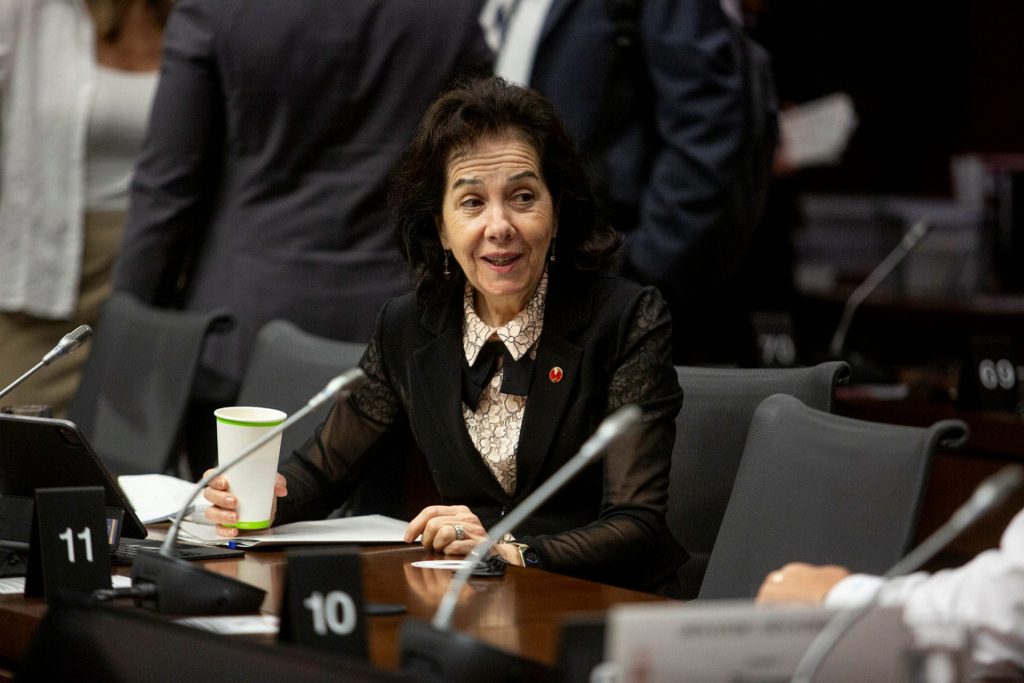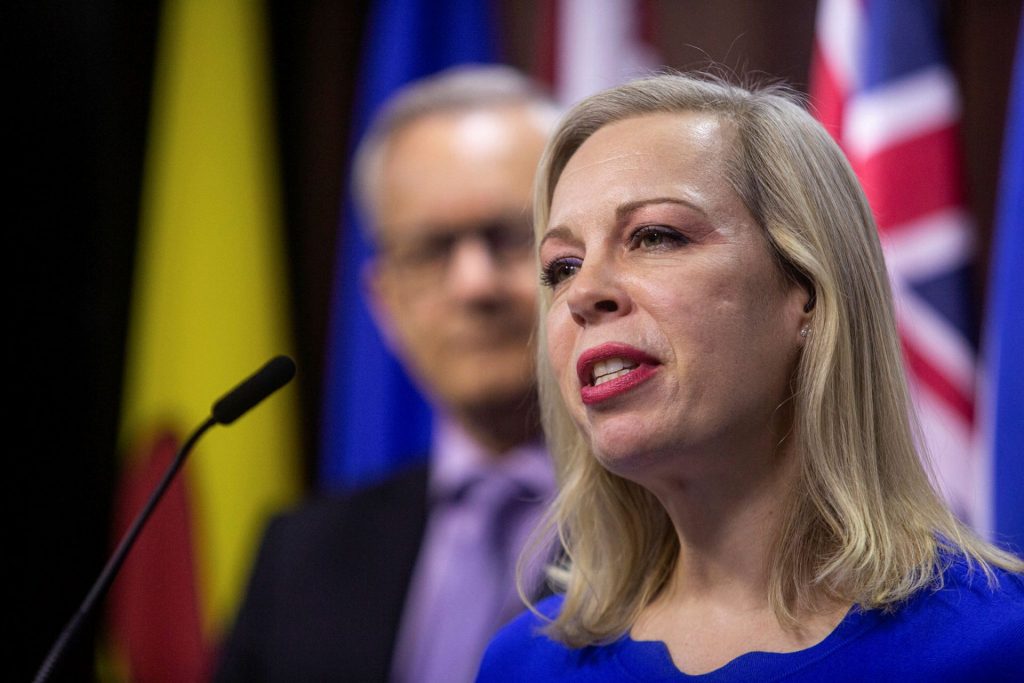Progressive Senator Peter Harder’s sights remain set on the use—and potential misuse—of the Charter of Rights and Freedoms’ notwithstanding clause, and his latest push to tackle the matter through legislative amendments to the Constitution Act is sparking the desired debate.
“I hope that these amendments to the Constitution can find favour in the Senate and then be sent to the House and be, in a sense, a guide to future Parliaments [on] how the use by the Parliament of Canada of the notwithstanding clause could be tempered,” said Harder (Ontario) of his bill, S-218.
Known as the notwithstanding clause, Section 33 of the Charter of Rights and Freedoms allows federal and provincial legislatures to declare that an act, or provisions of one, can go ahead notwithstanding the fact that it is seen to—or could be seen to, in the case of pre-emptive use before a court ruling—contravene Section 2, or sections 7 through 15 of the Charter, which enshrine fundamental freedoms (including of religion, thought, and peaceful assembly), and legal and equality rights.
Amid then-prime minister Pierre Trudeau’s push to patriate the Constitution and entrench the Charter of Rights within it, Section 33’s inclusion in the latter document was agreed to as a political compromise to get all provinces—ultimately excluding Quebec—on side.
“Section 33 was seen as a safety valve to be used only on rare occasions, and it was expected that it would be used in relation to non-controversial issues,” reads a Library of Parliament write-up on the clause.
Since 1982, it has been proposed or invoked more than 20 times provincially—largely in Quebec, but also in Ontario, Saskatchewan, Alberta, New Brunswick, and the Yukon—including eight times since 2018. It has yet to be used at the federal level.
During the previous Parliament, Harder introduced a motion on the subject proposing the “Senate express the view that it should not adopt any bill that contains a declaration pursuant to section 33 of the Canadian Charter of Rights and Freedoms.”
At the time, Harder told The Hill Times his aim was to prompt debate and reflection, arguing that attitudes towards use of the clause have changed since the Charter was adopted, and that the handling of legislation that invokes it should, too. Top of mind for Harder were multiple instances of pre-emptive use of Section 33 by provincial governments in recent years, and comments by Conservative Leader Pierre Poilievre in April and September 2024 indicating his willingness to invoke the clause federally.
Currently at second reading in the Senate, Bill S-218 tackles the matter from a different angle, proposing a series of amendments to the Constitution Act, 1982, to set out a new process by which Parliament would handle such bills.

“This question—which is very, very complex—deserves more than a conversation,” said Harder on July 10, and introducing a bill gives the Senate “opportunity to further study all the implications and perhaps try to recommend some framework that could be useful to any government” looking to invoke the clause.
Harder said his already ongoing efforts to draft the bill during prorogation were accelerated following Poilievre’s campaign commitment to restore—through use of Section 33—powers struck down by the Supreme Court in 2022 to enable judges to sentence multiple murderers to consecutive prison sentences beyond 25 years, without the possibility of parole.
Specifically, S-218 would require any legislation that invokes Section 33 to be introduced by a minister in the House, and only if the Supreme Court has already found—through a reference question or other ruling—that use of the clause would be required. That bill would have to include a preamble setting out reasons for use of Section 33, and the minister introducing it would have to table a statement setting out the potential rights and freedoms that would be infringed, and why such infringement can’t be justified as a “reasonable” limit.
Harder’s bill further sets out that, in consideration of such legislation, neither the House nor the Senate could adopt a time-allocation motion to limit debate, or consider it as part of a committee of the whole. Moreover, S-218 would require a bill using the notwithstanding clause to have support from two-thirds of the House, and from MPs from at least two recognized parties, in order to be passed at third reading in the Lower Chamber.
Asked why such stipulations only apply to the House, not the Senate, Harder said given the independence of the Upper Chamber, there “wouldn’t be partisan imperative” in the handling of such legislation, and that he thinks it’s important for the House to have “agreed processes for the manner and form in which” it would deal with such bills.
“I was around at the time of the repatriation, and I am devoted to the Charter of Rights and Freedoms, and I believe that each generation must—in its own way—advance and protect the rights that were so hardly fought [for] by earlier legislators,” said Harder. “You don’t need a Charter of Rights and Freedoms to protect the rich and the wealthy and the privileged, you need it to protect minority rights, and those who don’t readily have available the levers of power.”
An ‘extremely high threshold’
Independent Senators Group Facilitator Raymonde Saint-Germain (De la Vallière, Que.) has a number of questions, and some concerns, with Harder’s bill as currently proposed, but overall wants to see it sent to committee for study—and amendment.
Saint-Germain said Section 33 should be used rarely and in exceptional circumstances, and she shares the concern over “the lack of criteria for parliamentarians to examine” bills that invoke it.

But among Saint-Germain’s concerns are the “pre-emptive” restrictions S-218 would place on the House and Senate’s ability to legislate as they see fit—including by using the legitimate forum of a committee of the whole, which she said can enable all members of a Chamber to benefit from witness testimony. She said the bill would also bring the Supreme Court “very close to the legislative process,” and put it in a position of potentially “restricting parliamentarians’ work.”
“This, for me, deserves further consideration,” said Saint-Germain.
She also highlighted the fact that, by requiring two-thirds of votes to come from members of at least two recognized parties in the House, S-218 would introduce “the notion of a political party, or partisan politics, in the Constitution … for the first time.”
While she said she understands the aim of disabling a majority government from passing such legislation unilaterally, the two-party requirement and super-majority vote are thresholds that would be “very demanding for Parliament,” and would in effect make S-218 “an obstructive bill.”
Saint-Germain also questioned how a federal bill that references provincial legislation that invokes the notwithstanding clause—like last Parliament’s Bill C-13—would be handled under Harder’s proposed scheme.
“This is why I do believe that this bill needs further consideration, more scrutiny, and, for me, the committee is the right place to do so,” she said.
Saint-Germain said she believes S-218 “is amendable.” Moreover, she said killing it at second reading would send the wrong message “that the Senate doesn’t care about the use of the notwithstanding clause, which is not the case.”
“We need a framework, we need criteria … This is why I think [S-]218 is relevant, but not ready to be passed and certainly in its current form.”
Conservative Senator Denise Batters (Saskatchewan), the official opposition critic for S-218, similarly highlighted the proposed super-majority vote requirement as an area of concern—including that it’s a requirement only stipulated for the final vote in the House.
“His bill is silent on what vote percentage is needed in the Senate … and I kind of wonder if maybe that’s because he thinks he’s made passage of such a bill using the notwithstanding clause so utterly impossible in the House of Commons that it would never even come to the Senate,” said Batters.
With the “extremely high threshold” set out, “it seems quite clear to me that Senator Harder’s bill is designed to prevent the notwithstanding clause from ever being used,” she argued, stressing that it’s “a legitimate part of our Canadian Constitution.”

Batters likewise noted the requirement for Supreme Court decisions, saying it would be “quite a major difference” to the legislative process, “and a problem.”
She also challenged Harder’s assertion that the proposed amendments could be enacted without requiring the support of at least seven provinces representing at least 50 per cent of Canada’s population, in addition to the House and Senate.
Harder has argued that, since his bill only affects parliamentary machinations, the changes could be brought about through the Constitution’s Section 44 amending formula, which allows Parliament to unilaterally pass changes related to the government, Senate, or the House. In his sponsor speech on S-218, Harder noted the latter formula has been used previously to increase the number of seats in the House, and to add a Senator for Nunavut to the Upper Chamber.
Batters contended that preventing the use of the notwithstanding clause is “a far cry from that kind of example,” and said “some legal scholars and academics” have questioned whether Harder’s bill could go ahead unilaterally as proposed.
That said, the first concern raised by Batters in speaking with The Hill Times on July 16 was her perception of partisan motivations, pointing to Harder’s repeated reference to Poilievre’s comments on potential pre-emptive use of the clause.
“To me, it’s clear that Senator Harder’s motivation in bringing this bill forward … is primarily political,” she said.
Batters also questioned the degree to which Harder has had support from the Liberal government in drafting his bill. “If this is really a government bill, it would be fair to put it forward to us as a government bill,” she said.
Asked who he consulted in drafting S-218, and whether anyone from the Lower Chamber was on the list, Harder said he consulted with “our legal counsel” and the Canadian Bar Association. As to whether he’s been in touch with anyone from the House, including Government House Leader Steven MacKinnon (Gatineau, Que.), the minister responsible for democratic institutions, Harder didn’t directly respond, but said “a number of Members of Parliament have contacted me to indicate their support for the bill.”
“As we move forward, I will increase that effort, but I think at the present time, my focus is on getting appropriate debate in the Senate and getting it to committee,” said Harder.
MacKinnon’s office declined to offer comment.
The Hill Times
